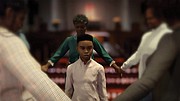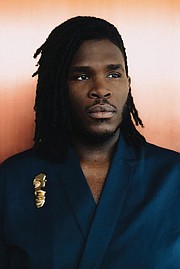A member of the second-oldest Black Catholic order in america.
A voodoo priestess.
A homosexual atheist lady.
A brand new documentary from the Nationwide Museum of African American Historical past and Tradition explores the vary of religion and non secular expressions of Black millennials and the alternatives they’ve made to reject— or embrace — the spiritual rituals of their childhood.
Dr. Teddy Reeves, the creator and producer of “gOD-Discuss: A Black Millennials and Religion Dialog,” mentioned the documentary exhibits that the time period “nones” — utilized by lecturers and journalists to explain individuals with no specific spiritual affiliation, usually of youthful generations — ceaselessly doesn’t apply to this demographic of Black individuals born between 1981 and 1996.
In an Oct. 23 interview after the movie’s weekend premiere on the downtown Washington museum, he mentioned the two-hour documentary, a product of the museum’s Heart for the Research of African American Spiritual Life in partnership with the Pew Analysis Heart, goals to offer voice to the individuals of this technology and allow them to determine themselves.
“We present the pluralistic nature of the African American spiritual expertise,” Rev. Reeves advised Faith Information Service, “from those that are of some formal religion custom to those that usually are not.”
And from those that are someplace in between, those who say “’I’m Christianish’ to those that say, ‘I’m a spiritualist. I’m simply discovering my manner,’” mentioned Dr. Reeves.
“So we tried to guarantee that we present that breadth.”
Although the traditions fluctuate broadly and Black millennials are much less spiritual than older Black People, Pew’s analysis discovered that the overwhelming majority — 96% — nonetheless say they consider in God or a better energy.
The documentary contains critiques of the normal Black church, with featured audio system describing what it was wish to develop up with a single father or mother who was chastised by the church
or adults who scolded them for views or conduct deemed immoral by congregational leaders.
“I grew up in a religion context that principally advised me that if my mom obeyed and beloved God extra, I wouldn’t be right here,” mentioned Candice Marie Benbow, a self- recognized “seeker” who is also an occasional columnist for RNS.
She described how her mom took refuge in a church the place they had been “in a position to dwell and thrive” after an earlier one sought an apology from her throughout her unwed being pregnant with Ms. Benbow. The creator and theologian however additionally describes herself as “Baptist born, Baptist bred, once I die I’ll be Baptist lifeless.”
Tre’vell Anderson, an leisure journalist who identifies as “a nonbinary particular person of trans expertise,” recalled rising up in a Pentecostal church the place being homosexual was thought-about a sin and changing into the topic of a particular “after-church” ceremony.
“I keep in mind them turning lights down low, lighting some candles and there being a prayer, a large prayer scenario about me,” mentioned Mr. Anderson, who’s described within the documentary as “Christian-ish.”
As Dr. Reeves depends on Pew knowledge that exhibits Black millennials’ persevering with connections to non secular issues, he compares the stances of a few of them to the work of Protestant reformer Martin Luther — however notes millennials’ considerations are wider than institutional Christianity.
“They’re not strolling away from the assumption in one thing larger than themselves,” he mentioned.
“They’re strolling away from establishments. And in order that, for us, is one thing for us to start to grapple with as we take into consideration the longevity and sustainability of our spiritual establishments on this nation.”
The documentary’s greater than 100 photographs — drawn from the museum and from the broader Smithsonian collections — usually function the traditions of the Black church, from the dimpled younger usher handing out church followers to a choir processing down a middle aisle. However the movie additionally contains depictions of non-Christian traditions, akin to mystic Tamil Jones utilizing tarot playing cards and lighting sage or former Baptist Rashid Hughes training mindfulness and yoga.
Mr. Hughes was among the many three dozen featured audio system within the movie and described the necessity to discover himself in a observe totally different from his childhood religion, whilst he had “deep concern” of shedding the neighborhood that helped elevate him.
“There was part of me that acknowledged that I used to be actually used to and aware of exploring the questions of like: Who’s God? What’s God?
However I wasn’t as aware of the query of who am I?” he mentioned. “And once I actually obtained launched to type of Buddhist practices and mindfulness practices, what that offered for me was a second to let go of the
looking for, the fixed striving, the laboring, to type of get God nearer to me.”
Dr. Reeves, 37, an ordained minister within the Progressive Nationwide Baptist Conference who describes himself as a “knowledge seeker,” mentioned he expects the viewers for the movie is not going to solely be African-People or individuals who dwell within the U.S.
“We had people who attended the premiere who weren’t Black they usually had been saying the identical factor,” he mentioned. “White Jewish temples are struggling simply as a lot as Black Christian areas are struggling to get younger individuals to come back past Excessive Holy Days.”
The movie is ready to display screen on the annual conferences of the American Academy of Faith and the Society of Biblical Literature in November.
“gOD-Discuss” was a finalist within the documentary class on the Charlotte Black Movie Competition in July.





